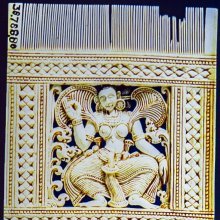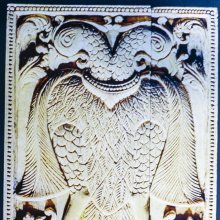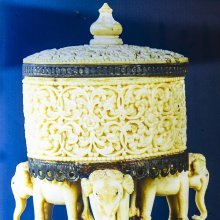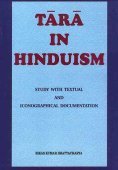Era, Ēra, Ērā, Ēṟa: 6 definitions
Introduction:
Era means something in Hinduism, Sanskrit, Marathi, Hindi, biology, Tamil. If you want to know the exact meaning, history, etymology or English translation of this term then check out the descriptions on this page. Add your comment or reference to a book if you want to contribute to this summary article.
Images (photo gallery)
(+70 more images available)
Biology (plants and animals)
Source: Google Books: CRC World Dictionary (Regional names)1) Era in India is the name of a plant defined with Ochlandra travancorica in various botanical sources. This page contains potential references in Ayurveda, modern medicine, and other folk traditions or local practices It has the synonym Bheesa travancorica Bedd. (among others).
2) Era is also identified with Ricinus communis It has the synonym Cataputia minor Ludw. (etc.).
Example references for further research on medicinal uses or toxicity (see latin names for full list):
· Rheedea (1995)
· Davidsonia (1981)
· Rheedea (1994)
· Select Plants (1872)
· Sir Ferdinand Jacob Heinrich von Mueller (1825–1896), (1825)
· Flora Sylvatica for Southern India (1873)
If you are looking for specific details regarding Era, for example diet and recipes, side effects, extract dosage, pregnancy safety, chemical composition, health benefits, have a look at these references.

This sections includes definitions from the five kingdoms of living things: Animals, Plants, Fungi, Protists and Monera. It will include both the official binomial nomenclature (scientific names usually in Latin) as well as regional spellings and variants.
Languages of India and abroad
Marathi-English dictionary
Source: DDSA: The Molesworth Marathi and English Dictionaryēra (एर).—a (itara S) The others or rest; that or the other; as opp. to something specified. Hence Of little estimation or use--person or thing. 2 (Poetry.) Other or different.
Marathi is an Indo-European language having over 70 million native speakers people in (predominantly) Maharashtra India. Marathi, like many other Indo-Aryan languages, evolved from early forms of Prakrit, which itself is a subset of Sanskrit, one of the most ancient languages of the world.
Sanskrit dictionary
Source: Cologne Digital Sanskrit Dictionaries: Monier-Williams Sanskrit-English DictionaryErā (एरा):—f. a ewe (eḍakā), [cf. Lexicographers, esp. such as amarasiṃha, halāyudha, hemacandra, etc.]
Sanskrit, also spelled संस्कृतम् (saṃskṛtam), is an ancient language of India commonly seen as the grandmother of the Indo-European language family (even English!). Closely allied with Prakrit and Pali, Sanskrit is more exhaustive in both grammar and terms and has the most extensive collection of literature in the world, greatly surpassing its sister-languages Greek and Latin.
Hindi dictionary
Source: DDSA: A practical Hindi-English dictionaryEra in Hindi refers in English to:—(nf) the earth; speech..—era (इरा) is alternatively transliterated as Irā.
...
Kannada-English dictionary
Source: Alar: Kannada-English corpusEra (ಎರ):—
1) [noun] the tree Ziziphus mauritiana ( = Z. jujuba) of Rhamnaceae family.
2) [noun] its edible fruit; jujube.
Kannada is a Dravidian language (as opposed to the Indo-European language family) mainly spoken in the southwestern region of India.
Tamil dictionary
Source: DDSA: University of Madras: Tamil LexiconĒra (ஏர) particle < ஏர்-. [er-.] An adverbial word of comparison; ஓர் உவமவுருபு. [or uvamavurupu.] (தொல். பொ. [thol. po.] 286, உரை. [urai.])
--- OR ---
Ērā (ஏரா) noun Keel of a ship; கப்பலின் அடிப்பொருத்து மரம். [kappalin adipporuthu maram.] (J.)
--- OR ---
Ērā (ஏரா) noun See ஏராக்கள். [erakkal.] (J.)
--- OR ---
Ēṟa (ஏற) adverb < ஏறு-. [eru-.]
1. So as to exceed; more than; அதிகமாக. அரைப்படிக்கு ஏறக்கொடு. [athigamaga. araippadikku erakkodu.]
2. On high, in the air, above; உயர. அந்தர மாறா . . . ஏறப்பறக்கெனிற் பறந்திடும் [uyara. anthara mara . . . erapparakkenir paranthidum] (சீவகசிந்தாமணி [sivagasindamani] 2156).
3. Completely, entirely; முழுவதும். என்னுடை யிருளை யேறத் துரந்தும் [muzhuvathum. ennudai yirulai yerath thuranthum] (திருவாசகம் [thiruvasagam] 2, 6).
4. In advance, forward; முற்பட. மாமனிடத்து ஏறச்செல்லு நிலைமையை விரும்பும் [murpada. mamanidathu erachellu nilaimaiyai virumbum] (சீவகசிந்தாமணி [sivagasindamani] 1932, உரை [urai]).
Tamil is an ancient language of India from the Dravidian family spoken by roughly 250 million people mainly in southern India and Sri Lanka.
See also (Relevant definitions)
Starts with (+239): Er-alattavanai, Era kolla gadi, Era pat, Era-badu, Era-gach, Era-irankapar, Era-kattitukku, Era-kuraiyapecu, Era-mudu, Era-pla, Erabudu, Eracadu, Eracalu, Erachiketti, Eracu, Eradacci, Eradagu, Eradane, Eradaneya, Eradari.
Ends with (+967): Aarakeera, Abera, Abies procera, Acacia mellifera, Acalypha supera, Acchera, Acera, Achyranthes aspera, Adabeera, Adahatera, Addasugivera, Adenia gummifera, Adormidera, Adwera, Aeschynomene afraspera, Aeschynomene aspera, Agera, Ahera, Ainsliaea aptera, Ajamera.
Full-text (+927): Shaka, Samvat, Shalivahana, Shakabda, Karanabda, Erappalakai, Erakkal, Isavi, Shreyamsa, Munisuvrata, Svayamprabha, Sarvanubhuti, Era-irankapar, Nagarjuna, Mahayashas, Eramaram, Suparshvaka, Erattala, Vikrama, Erashera.
Relevant text
Search found 222 books and stories containing Era, Ēra, Erā, Ērā, Ēṟa, Aera, Eraa, Aeraa; (plurals include: Eras, Ēras, Erās, Ērās, Ēṟas, Aeras, Eraas, Aeraas). You can also click to the full overview containing English textual excerpts. Below are direct links for the most relevant articles:
Tiruvaymoli (Thiruvaimozhi): English translation (by S. Satyamurthi Ayyangar)
Pasuram 3.8.5 < [Section 8 - Eighth Tiruvaymoli (Mutiyane)]
Pasuram 3.10.5 < [Section 10 - Tenth Tiruvaymoli (Canmam Palapala)]
Introduction to Section 5.2 < [Section 2 - Second Tiruvaymoli (Polika Polika)]
Dvisahasri of Tembesvami (Summary and Study) (by Upadhyay Mihirkumar Sudhirbhai)
Incorporation of Mahābhārata and Purāṇas in the Dvisāhasrī < [H. H. Ṭembesvāmī: Erudition]
Chapter 1 - Connection to the Personal Account
Chapter 2 - Narration of the story of a teacher and a disciple
Bodhisattvacharyavatara (by Andreas Kretschmar)
Text Section 39 < [Khenpo Chöga’s Oral Explanations]
Text Sections 265-266 / Stanza 19 < [Khenpo Chöga’s Oral Explanations]
Text Section 117 < [Khenpo Chöga’s Oral Explanations]
Related products
(+10 more products available)











